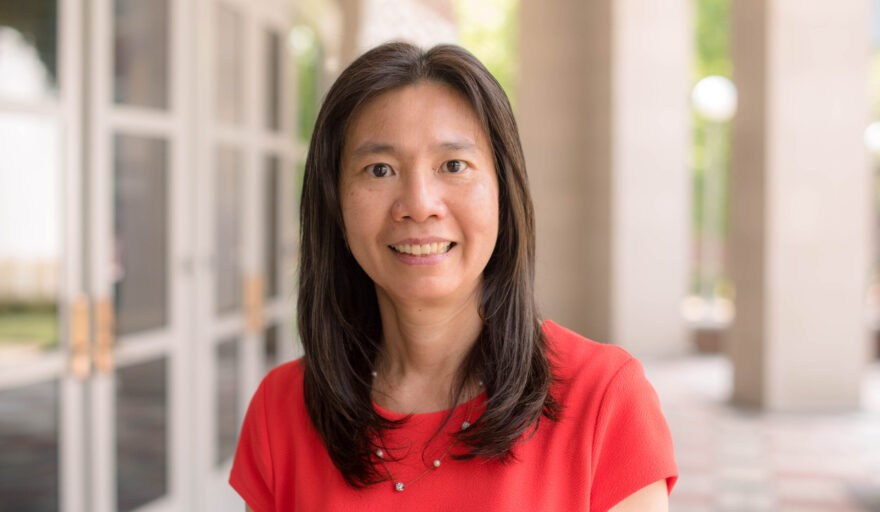Fulbright Scholar’s Taiwanese University Collaboration
Chi Fang Wu
PhD Program Director, Professor

Research in social safety nets for low-income single-mother families will help guide policymakers in Taiwan and benefit mothers and children.
For Chi-Fang Wu, it was a dream come true.
From January through July 2023, the professor and director of the PhD program in the School of Social Work got to spend time in Taipei City, Taiwan, where she grew up.
But it wasn’t an extended vacation. It was to conduct the research on the impact of social safety net programs among low-income families in Taiwan, for which she was awarded a Fulbright scholarship. She was sponsored by National Taiwan University, renowned for its social work program and a long-time collaborator with Illinois’ School of Social Work.
“It’s been my dream to come back and teach at NTU because, growing up in a low-income family, I could never imagine being able to do so,” Wu says.
Wu collaborated with NTU faculty in examining the effects of unemployment and underemployment on the economic well-being of single-mother families and determining the efficacy of social safety net programs for these families. In addition, she taught graduate social welfare policy courses and mentored PhD students on enhancing their research methods and their teaching skills.
“Most Fulbright scholars either conduct research or teach, but for me it was hard to choose,” she says. “So, I chose to do both. I wanted to help the next generation of social workers analyze current social welfare policy in Taiwan and to become effective agents of change that will benefit the world in the years to come.”
While in Taiwan, Wu made nine presentations at various universities and organizations. She presented on multiple program participation, employment, and material hardship. She also presented on the pros and cons of the American welfare system and on the differences between the American and the Taiwanese social welfare systems. Government officials found her presentation so meaningful that they were shared with state and city government officials who had not attended her presentation.
Her final presentations for the Fulbright at NTU focused on a discussion of multiple studies in which she analyzed data from both Taiwan and the United States. Her findings highlighted how the different social welfare policies influence the populations’ economic well-being. Her research is leading the way to new collaborations with scholars within the International Social Welfare Conference network, including with academics from South Korea, Japan, and Singapore.
Long Partnership with NTU
Wu’s recent work in Taiwan continues the collaboration between the School of Social Work and NTU. Wu, who has been at the University of Illinois Urbana Champaign since 2005, points to 2008 as the starting point in the relationship.
“That’s when we began having informal conversations,” Wu says, referring to talks between herself, former dean Wynne Korr, and Joyce Feng, who earned her PhD at the School of Social Work and went on to a long-time career at NTU as a professor and later as social work department chair and NTU dean of students. Susan Cole, emerita professor in the School of Social Work and a fellow Fulbright scholar—the first from the School—who also taught at NTU, joined the conversations. Those conversations turned into the first of many biennial conferences between the two programs, with host duties alternating between the two schools from one conference to the next.
Former dean Steve Anderson says that the partnership between the School and NTU makes a lot of sense.
“You start with the connection with Joyce Feng, and we’ve always had a lot of Taiwanese PhD students over here,” he says. “Chi-Fang has been a big part of that. And the School, over time, has had an interest in having a larger international presence, and starting with a place where we had a connection through students was a good reason to go to NTU. Their interests in social issues, in poverty-related issues, in economic development issues, have quite a correspondence to what we do here.”
Anderson notes a summer exchange program that has been running for many years, where NTU students come to Urbana-Champaign to learn about the US social services system.
“In terms of an exchange relationship, it’s been probably the most stable one we’ve had from both a student side and a teaching and research side,” he says. The Taiwanese students who earn their PhDs from Illinois often go back to universities in Taiwan, he adds.
“From my standpoint, one of the more rewarding parts of this whole relationship is we have made a pretty big difference in Taiwan in educating their PhD faculty members,” Anderson says.
Relationship Benefits Both Sides
Wu sees benefits for both the School and NTU.
“We learn from each other. The School’s strengths include its productive and interesting research, which gives Taiwanese scholars a different view of the social work research agenda and creative ideas on how to provide for interdisciplinary initiatives and more advanced training for doctoral students. The NTU faculty have strong practical experience and are adept at integrating research and practice.”
“Through our student exchanges and our research collaborations, we maximize our impact and understanding,” Wu says.
Her time in Taiwan the first seven months of this year proved invaluable to Wu, both professionally and personally. Her work as a Fulbright scholar has influenced policymakers across Taiwan, provided practical skills to emerging scholars, and laid the groundwork for continued collaborations.
“I was able to use my experience in both cultures to strengthen and deepen an institutional partnership that will provide bilateral value to both institutions,” Wu says. “We are building a stronger global partnership between the institutions, one that is sustainable over time. The sharing of resources and learning between the two institutions will enable collaboration, producing insights neither of us could achieve working in isolation.”